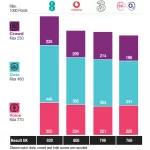Study Claims UK Phone and Broadband ISP Prices Have Sky-rocketed
A new study claims that broadband and home phone prices for “loyal customers” (i.e. those who prefer to stay with the same ISP rather than switch) have increased by an inflation-busting 40% since 2011 and are thus paying on average £8.59 a month (£103 a year) more now than they were four years ago.
The uSwitch study, which is partly based off a nationally representative June 2015 ‘Opinium’ survey of 2,000 broadband users, notes that 30% of people have never switched provider and so would fall into the above group.
Advertisement
The same survey also found that 44% people are unsure when their broadband contracts end, which could be solved if ISPs were required to actively notify subscribers about such events. Apparently 60% of consumers would support such a feature, although a similar proportion suggests they would be more likely to switch ISP after receiving a reminder (this is one reason why ISPs are so reluctant to do it).
NOTE: We take the following price comparison table with a big pinch of salt as some of the costs don’t seem correct. For example, the non-offer SimplyBroadband (TalkTalk) price today is £7.50 (broadband) + £17.70 line rental, which makes for a total of £25.2 per month and not £30.99 as listed below. It’s also unclear which packages are being compared and what other discounts or costs have been factored (activation? install? etc.), although some ISPs like BT do hike their prices sharply at the end of a contract.
Non-fibre broadband deals (including line rental)
|
Provider Advertisement |
Average monthly cost following contract end (2015) |
Average monthly cost following contract end (2011) |
|
£25.20 Advertisement |
£20.30 |
|
|
£27.40 |
£22.25 |
|
|
£30.99 |
£27.90 |
|
|
£26.39 |
£17.75 |
|
|
£26.98 |
£18.48 |
|
|
Average |
£27.39 |
£21.33 |
Fibre broadband deals (including line rental)
|
Provider |
Average monthly cost following contract end (2015) |
Average monthly cost following contract end (2011) |
|
BT |
£42.99 |
£31.90 |
|
£37.40 |
N/A |
|
|
£34.49 |
£27.40 |
|
|
TalkTalk |
£35.20 |
N/A |
|
£31.98 |
N/A |
|
|
£36.35 |
N/A |
|
|
Average |
£36.40 |
£29.65 |
Obviously it goes without saying that the best deals can usually be had by switching providers at the end of a contract, which is now a lot easier thanks to Ofcom’s new harmonised switching system (here). However uSwitch fails to reflect that sometimes switching providers can also attract additional costs, such as exit fees or new activation / installation charges (monthly rental is only part of the overall picture).
Similarly Ofcom’s new switching system only works on Openreach and KC’s telecoms platform, which means that swapping to Virgin Media’s independent cable network or other non-Openreach based broadband and phone services can sometimes result in additional installation complications or longer downtime.
On top of that the consumer experience will vary between ISPs, with some providers making more modest changes to pricing than others. Meanwhile a lot of ISPs prefer to mask their prices by lumping them all onto line rental, although 2015 has already seen both broadband and phone prices rising more sharply than we’ve seen in previous years (e.g. TalkTalk’s sharp price hikes).
In fact the situation has grown to become such an issue that even the national telecoms regulator, Ofcom, recently raised concern (here).
Sharon White, CEO of Ofcom, said:
“There are signs in recent months of rising prices for landline and broadband customers, without the apparent justification of higher costs or improved service. BT, Sky, TalkTalk and Virgin Media have all raised line rental prices this year.
This might be a temporary blip in the market, and there are still good offers out there for people who shop around. But customers who worry about the hassle of leaving their current provider, especially older people, can face higher bills. We are concerned about this, and we are watching these developments in the market closely.”
Mind you such price hikes have become a regular occurrence and so quite why Ofcom are now taking such notice is difficult to know, although certainly a few ISPs have made some fairly big changes in 2015 and that’s perhaps helped to prompt their interest.
Whether or not Ofcom can actually do anything about this is another matter entirely, but their on-going Strategic Review might well propose some partial solutions. Equally we shouldn’t forget that service quality is another important metric that needs to be considered (the less you pay, the less you get).
Mark is a professional technology writer, IT consultant and computer engineer from Dorset (England), he also founded ISPreview in 1999 and enjoys analysing the latest telecoms and broadband developments. Find me on X (Twitter), Mastodon, Facebook, BlueSky, Threads.net and Linkedin.
« EU Approves Law to Protect Net Neutrality and Free Mobile Roaming


















































Comments are closed